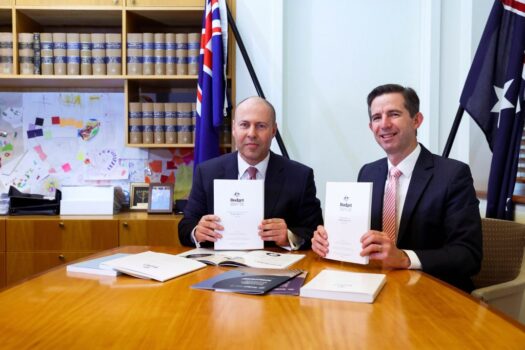
Finance Minister Simon Birmingham is confident Australia will retain its AAA credit rating after the government last week unveiled a big spending program with the release of the 2021-22 federal budget.
When asked on whether the government would be responsible for a possible downgrade of its credit rating after the release of the budget, Senator Birmingham responded, “We are not expecting that to happen.”
“The rating agencies themselves issued their own statements, in their own words, last week in which they were very positive about the government’s strategy in this budget and the approach we are taking,” he told Sky News Australia.
The three main global credit agencies—Moody’s Investors Service, Standard & Poor’s, and Fitch Ratings—all rate Australia as AAA, with the latter two issuing negative outlooks on the country’s recent performance.
Credit ratings are important because a downgrade would see the cost of borrowing money from overseas markets by Australian governments, businesses, and banks increase. These extra costs would, in turn, be passed onto consumers.

However, in response to last weeks’ federal budget speech, Fitch Ratings said they believed that the government’s big-spending initiative would likely pay off and exceed forecasts.
“We believe there is potential for the public finances to overperform relative to the budget’s projections, given its relatively conservative assumptions for iron ore prices and employment,” a statement from Fitch Ratings said.
They also expect the government to reel in spending in the fiscal year of 2023 once unemployment comes under 5 percent, a benchmark set by Treasurer Josh Frydenberg.
Last week, Frydenberg unveiled around $100 billion in new spending measures to spur the Australian economy and drive down the unemployment rate.
“There is no economic recovery without a jobs recovery, and there is no budget recovery without a jobs recovery,” he told the National Press Club in his post-budget speech.
The budget included funding boosts to several sectors such as healthcare, aged care, mental health, women’s services, and education. It also included tax breaks for low-to-middle income earners and extending asset write-offs for business.
Federal Labor Shadow Treasurer Jim Chalmers claimed the budget left too many segments of society behind.
“It’s not a recovery if we go back to the type of inequality and immobility which has characterised the Liberals’ eight long years in office,” Chalmers told attendees at an Australian Council of Social Services event.
During the Federal Opposition’s budget reply, Labor Leader Anthony Albanese said the government’s budget was a “missed opportunity” for Australia and claimed it was nothing more than the “sorry tale of eight years of Liberal neglect.”
Albanese, however, did not repudiate many of the spending measures announced by Frydenberg, instead of announcing new initiatives including $10 billion towards 30,000 social housing homes over the next five years.





Be the first to comment